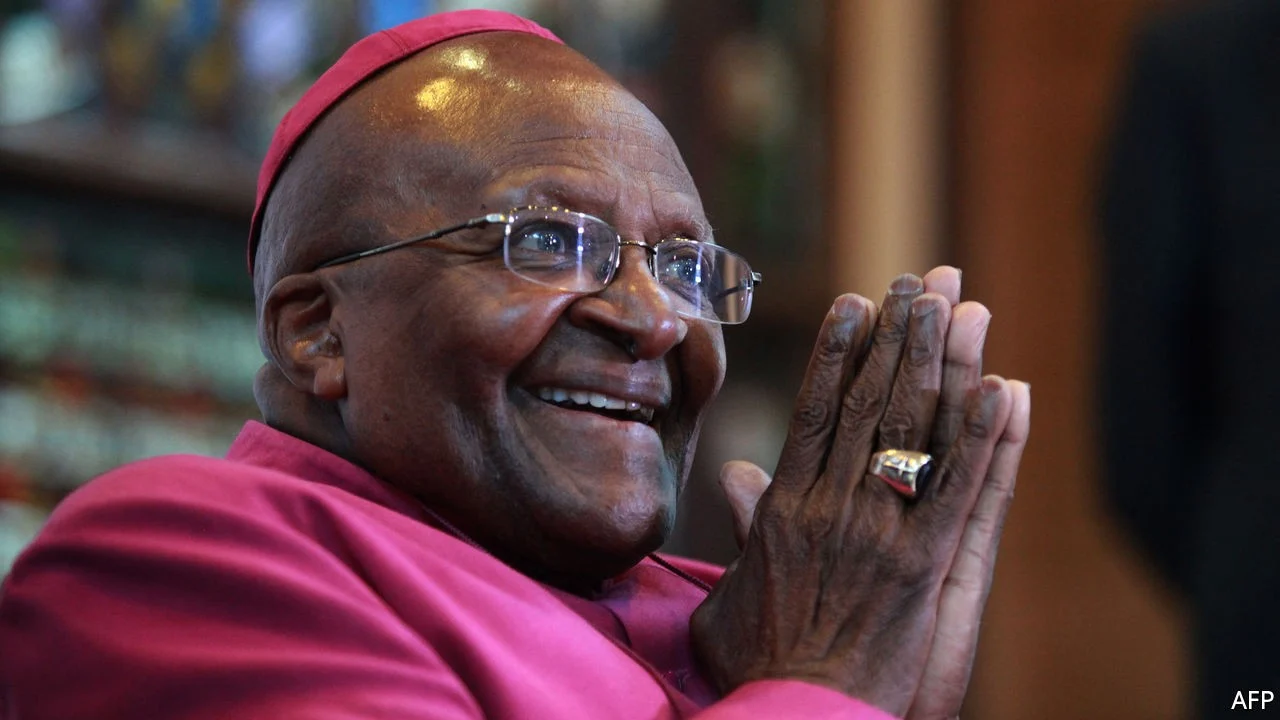THERE WERE many times, Desmond Tutu recalled, “when the apartheid rulers were strutting arrogantly, as if they were invincible cocks of the walk, and our people were being treated as if they were rubbish.” He wanted to whisper in God’s ear, “God, we know that you are in charge. Why don’t you make it slightly more obvious?”
For most of Archbishop Tutu’s long life, it did not seem obvious at all. He was a black man in a place where skin colour was imbued with cruel and absurd significance. At the height of apartheid, black South Africans were denied citizenship in their own country. They could not vote; their schools were awful; they could not enter white areas except as servants. Inter-racial love was illegal. Racial-classification bureaucrats subjected borderline cases to humiliating “tests”. (If a pencil, inserted in the subject’s hair, did not fall out, they might be deemed non-white, for example.) Black South Africans who protested against the hundreds of daily injustices they faced might be slashed with a sjambok (a fearsome rhino-hide whip)—or worse.
Yet the diminutive Mr Tutu kept piping up for the voiceless. And even as others picked up pangas and guns, he preached non-violent resistance. This was a hard sell, especially to the angry young men in black townships. One day in 1985 he was at a funeral for four youths thought to have been killed by the South African security police. Suddenly the crowd seized a man they accused of being an impimpi, or informer, and prepared a petrol-filled tire to “necklace” him (ie, burn him to death). Without pausing to think, Mr Tutu waded into the furious mob, ordered them to stop and rescued the terrified captive. “They seemed rather reluctant [to let him go],” he later wrote. “It was only afterward, when I saw it on television, that I considered my own peril.”
He was born in 1931 in Klerksdorp, in what was then the Transvaal province. His mother was a maid; his father, a teacher. He grew up amid constant racial slights. Yet he learned early on that not everyone was bigoted. When he was nine or ten, “a white man in a long cassock…doffed his hat to my mother”. It was Trevor Huddleston, an Anglican priest who taught that all people were equally children of God. Huddleston deeply influenced the young Mr Tutu, visiting him in hospital when he had turberculosis and showing him an example of courage as an anti-apartheid campaigner.
The gospels were political, Mr Tutu learned. A man of God—he was ordained in 1960—could also be a man of action. The sinister, euphemistic bureaucratese of apartheid, with its “homelands” (desolate areas to which black people were deported) and its “Ministry of Co-operation and Development” (which let whites boss around the black majority) could be rebutted with simple truths, plainly expressed. No one could improve on Mr Tutu’s encapsulation of the anti-apartheid struggle: “All we are asking you to do is to recognise that we are humans, too.”
He was tear-gassed and arrested for preaching this message. His passport was revoked more than once. And it was not only supporters of apartheid who criticised him. Advocates of gradual reform thought him too hasty when he demanded that apartheid be simply abolished. Advocates of armed struggle, who imagined that the regime could be overthrown by force, thought his non-violent approach too slow. Communists, of whom there were many in the liberation movement, disliked his distaste for communism.
Yet it was his vision that prevailed. The armed struggle went nowhere. Rather, it was a combination of economic sanctions and moral ostracism, both of which he championed, that ended apartheid. It helped, too, that the Soviet Union collapsed, thus ending the fears of many whites that giving up power would allow a communist takeover. By 1992 a majority of white South Africans were sufficiently ashamed of the status quo and sanguine about the future that they voted, in a referendum, to continue with reforms that led to multiracial democracy. In 1994, at the age of 62, Mr Tutu joined millions of black South Africans and cast his first vote.
He could have retired then, a Nobel Peace laureate and giant of the struggle. But the crimes of the old era needed to be documented and exposed. He presided over the Truth and Reconciliation Commission, a groundbreaking exercise in restorative, not retributive justice. Perpetrators of politically motivated atrocities from all sides were invited to make full disclosure. Those who satisfied the judges that they had told all were given full or partial amnesty. Victims and their families were compensated.
Many griped about the commission’s imperfections. The men who confessed were the ones who pulled the triggers, not the ones who gave the orders. Apartheid cabinet ministers carried on insisting that when they asked for dissidents to be “eliminated”, they meant “arrested”. Many bigwigs in the new ruling party, the African National Congress, also refused to co-operate with the commission. Its televised hearings achieved vital things, nonetheless. For the victims, they brought public acknowledgement. For the whites who had passively supported apartheid, looking the other way and denying its horrors, they brought detail upon detail of death squads and wet-bag torture, making it hard to sustain such denial. For all its flaws, the commission added volumes to the public’s understanding of the truth. As Mr Tutu put it, “the truth hurts.” But it is a necessary step towards reconciliation.
He hugely admired Nelson Mandela, South Africa’s first black president (and chuckled with delight when he was occasionally mistaken for him by foreigners). But he had stern words for Mandela’s successors. The anc’s policy of “black economic empowerment” was enriching a small elite, not the impoverished masses, he complained, prompting President Thabo Mbeki to brand him a liar. The kleptocratic administration of President Jacob Zuma was “worse than the apartheid government,” he said, “because at least you were expecting it with the apartheid government.” He held out hope that Mr Zuma’s successor, Cyril Ramaphosa, would curb corruption. (He is at least trying.)
Mr Tutu’s urge to agitate for what was right spilled far outside South Africa’s borders. He visited genocide sites in Rwanda. He campaigned for the church to allow gay people communion, saying he would not want to worship a homophobic God. With Mandela, he formed the Elders, a cabal of retired grandees who pushed for peace and universal healthcare, and against war and tyranny. Robert Mugabe, whom he accurately described as a caricature of an African dictator, retorted feebly that Tutu was “an angry, evil and embittered little bishop”.
For all the horrors he saw, he was certain that human beings were “made by goodness for goodness”—that everyone can repent. He drew comfort even from the evening headlines. “If wrong was the norm, it wouldn’t be news,” he wrote. Part of his charm—and his persuasiveness—lay in his mischievous sense of humour. He could laugh at himself, and even his own faith. He once joked about dying and, owing to a mix-up at the Pearly Gates, being sent to Hell. “A few days later, St Peter heard a bang, bang, banging at Heaven’s gate. He went to go check, and he saw that it was the Devil knocking. St Peter says to him, ‘Ja jong, what are you doing here?!’ The Devil replied, ‘Since you sent Tutu down to the warmer place, he’s been causing too much trouble! I came here to ask for political asylum.’”
By The Economist





